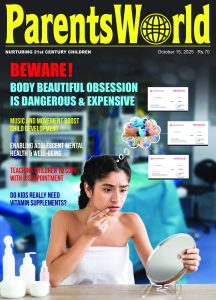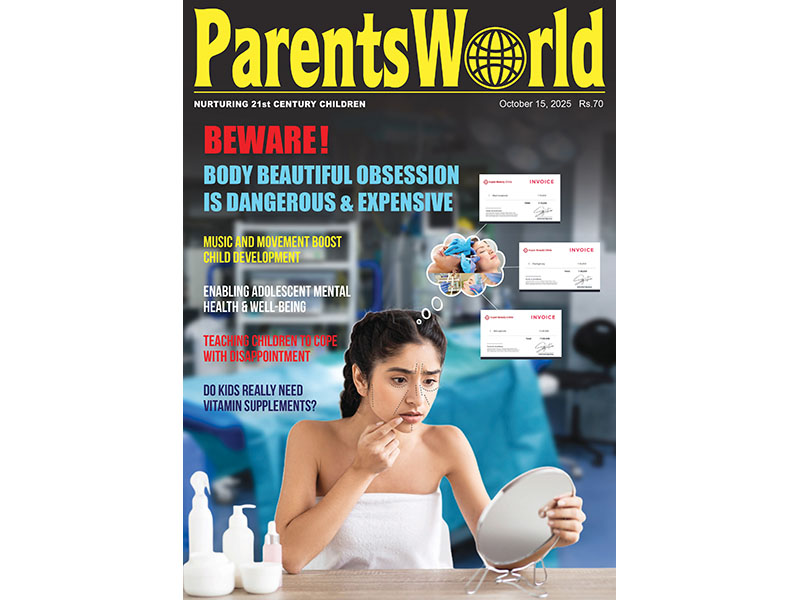No products in the cart.
Mailbox

Thought-provoking story
Your cover story ‘Beware! Body Beautiful Obsession is Dangerous & Expensive’ (PW October) is a thought-provoking feature on the growing obsessive look-good culture within Gen X.
The relentless pursuit of ‘idealised’ beauty standards — driven by social media filters, influencer culture, and endless scrolling — can take a serious toll on children’s mental, emotional, and physical well-being. Parents must make conscious efforts to limit their children’s exposure to narcissistic social media platforms, guide them toward responsible digital use, and help them understand the distorted reality behind “perfect” images. Most importantly, they should nurture their children’s self-esteem by encouraging engagement with online platforms that promote positive and realistic body image.
Aisha Ibrahim
Bengaluru
Music importance
Your Early Childhood essay ‘Music and Movement Boost Child Development’ (PW, October) offers a refreshing and insightful perspective on how young children learn best — not through books and worksheets, but through play, rhythm, music, and free expression. It’s a timely reminder that learning in the early years is a multisensory process that engages the body and mind together.
Child psychologist Riddhi Doshi Patel highlights how the “magical combination” of rhythm and motion can enhance timing, focus, coordination, and social-emotional skills such as communication, self-expression, empathy, and teamwork. Equally important, music and movement activities foster creativity, strengthen neural connections in the brain, and build confidence and joy in learning.
Vinny Datta
Pune
Nurturing resilience
Thank you for your insightful ‘Ask Your Counsellor’ column (PW, October), in which Bhubaneswar-based psychologist Reena Chopra offers thoughtful and practical parenting advice. Her guidance on nurturing emotional resilience in children was particularly valuable — reminding parents that life’s unpredictability and disappointments are natural, and that with understanding and support, children can learn to cope and grow stronger. She also urges parents to respond with empathy rather than criticism, and to avoid labelling children as “too sensitive” or “difficult.”
Nisha Jha
Ranchi
Boosting mental health
Your Adolescence Essay ‘Enabling Adolescent Mental Health & Well-Being’ (PW October) is a must-read for parents especially of teenage children.
Citing that nearly 7.3 percent of Indian adolescents experience diagnosable mental-health conditions — often exacerbated by social stigma, silence, and lack of awareness among parents and schools — the author makes a compelling case to shift parental focus from academic achievement to emotional resilience and mental well-being.
Equally important, the essay reminds educators and parents of the need to create open, non-judgmental spaces where teens feel heard and supported. Strengthening mental-health literacy, encouraging empathy and dialogue at home and in schools, and seeking timely professional help when needed can go a long way in enabling adolescents to thrive — not just survive — these formative years.
Priya Kanwar
Mumbai
Timely important message
Your Health & Nutrition essay ‘Do Kids Really Need Vitamin Supplements?’ (PW, October) was informative and balanced. While children’s supplements are aggressively marketed as boosters for immunity, brain development, and overall growth, as the author argues, scientific evidence supporting their use in otherwise healthy children is limited.
I agree with the author that a well-balanced, nutrient-rich diet is the best and most natural way to meet children’s nutritional needs. Routine supplementation is rarely necessary for healthy children and, when used without medical supervision, may even pose health risks. The key takeaway of the article — that supplements should never replace wholesome food and that parents should seek professional guidance when genuine health concerns arise — is timely and important in today’s market-driven wellness culture.
Garima Kapoor
Gurugram
















Add comment